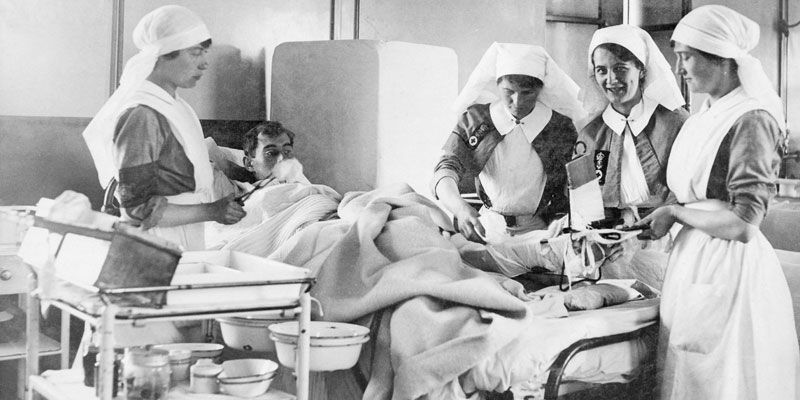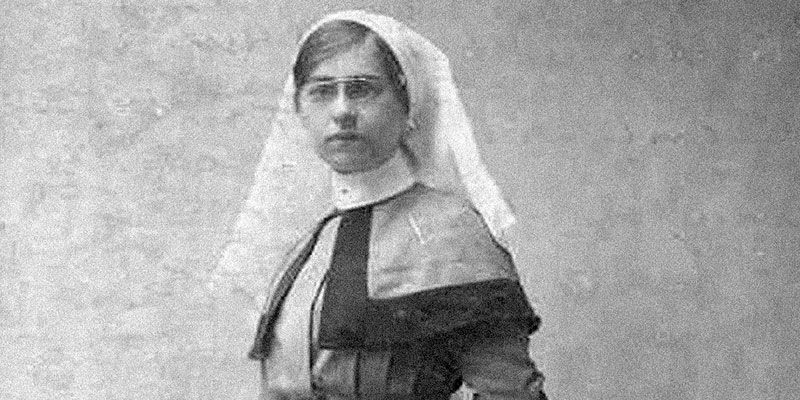
A recreated First World War field hospital and groundbreaking research into wound care will be combined as part of an innovative event partnering history with healthcare next week.
Members of the public are invited to the University of Leeds on Friday 17 November for an interactive exhibition, readings from First World War diaries, Edwardian-style afternoon tea and short talks from researchers, nurses and historians.
The free 3.30-5.30pm event for Nurses on the Frontline of Wound Care: from Passchendaele to Pressure Ulcers will commemorate Nellie Spindler, a Wakefield-born nurse who qualified in Leeds in 1915.
She died in August 1917 aged 26 after a blast at a hospital just three miles from the frontline near Ypres and was buried with full military honours. She is the only woman buried in the vast Lijssenthoek Military Cemetery – among 10,000 men.
The interactive exhibition includes a recreated field hospital 'staffed' by re-enactment group Wenches in Trenches which aims to raise awareness of the Voluntary Aid Detachment members, nurses and other women who served in the war.
The exhibition will also showcase items and objects from the University’s Special Collections, Leeds’ Thackray Medical Museum and from West Yorkshire Archive Service, as well as a poster display of research into wound care past and present.
“The First World War gave nurses new responsibilities for managing complex wound care in what were often difficult circumstances. The solutions they found and challenges they faced are still relevant to nurses today.”
Performances based on excerpts from First World War nurses’ diaries by historical interpreter Dr Kate Vigurs and former students of the University’s School of Performance and Cultural Industries will also take place.
The afternoon event will follow an academic conference on the same subject earlier that day. Both events are being held to coincide with Stop Pressure Ulcer Week, which aims to highlight a significant problem which affects 700,000 people in the UK each year. Treating pressure ulcers costs the NHS more than £3.8 million every day.
The events are being organised in partnership with Leeds Teaching Hospitals NHS Trust.
A lively panel discussion and talks after tea will include Professor Christine Hallett, Chair of the UK Association for the History of Nursing, whose new book Nurses of Passchendaele: Caring for the Wounded of the Ypres Campaigns 1914-1918 tells the stories of some of the women who tended those injured in some of the most bitter fighting of the war.
Professor Andrea Nelson, Head of the School of Healthcare and Deputy Dean of the Faculty of Medicine and Health at the University of Leeds, will talk about the role of nursing in contemporary chronic wound care, while Lieutenant Colonel (Retired) Gary Kenward will talk about contemporary military nursing.
Co-organiser Dr Mary Madden is a sociologist and Lecturer in Applied Health Research at Leeds. Her AHRC-funded project Exploring Histories and Futures of Innovation in Advanced Wound Care connects academics from a broad range of disciplines with patient and industry representatives to explore what can be learned from current and past developments in advanced wound care.
Dr Madden said: “Wound
care is a field with very little patient and public involvement and engagement.
It is a fundamental part of everyday healthcare but
it is often considered mundane and so gets overlooked – but it has important
consequences for patients and their families.”
Alison Fell, Professor of French Cultural History at Leeds, oversees Legacies of War – a series of research projects and outreach activities with partners in Leeds and Yorkshire focusing on the centenary of the First World War.
She said: “The First World War gave nurses new responsibilities for managing complex wound care in what were often difficult circumstances.
“I think that the solutions they found and challenges they faced – which they often wrote about in their letters and diaries – are still relevant to nurses today.”
Dr Heather Iles-Smith is Head of Nursing Research and Innovation at Leeds Teaching Hospitals NHS Trust and Honorary Clinical Associate Professor at the University. She said: “Leeds Teaching Hospitals NHS are proud and excited to be part of this unique and innovative event, which brings together personal stories of nursing in the First World War, contemporary nursing research and interactive exhibitions.”
The events are being supported by funds from the Leeds Teaching Hospitals Charitable Trust and Gateways to the First World War, a project funded by the Arts and Humanities Research Council.
- Nurses on the Frontline of Wound Care: from Passchendaele to Pressure Ulcers takes place in the Parkinson Building at the University of Leeds. For further information, and to reserve places for this free event, visit this Eventbrite page, where you will also find a link to the conference.
Further information
Main image shows a wounded man from Zeebrugge having his wounds dressed by naval and Red Cross nurses at Chatham. Credit: Wellcome Collection. Second picture shows nurse Nellie Spindler. Credit: Lijssenthoek Cemetery Visitor Centre.
For interviews, images or further information, contact Gareth Dant, Media Relations Manager at the University of Leeds on 0113 343 3996 or email g.j.dant@leeds.ac.uk
#WoundHistSoc #StopThePressure